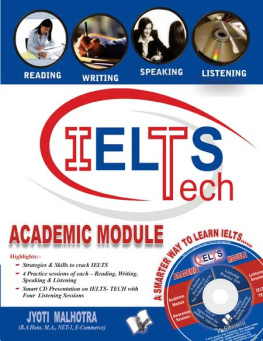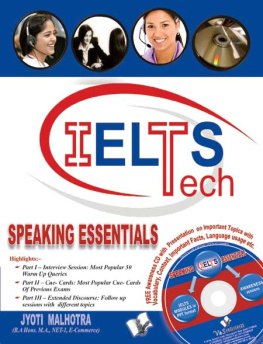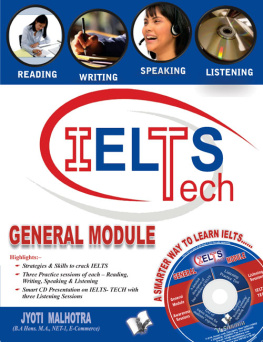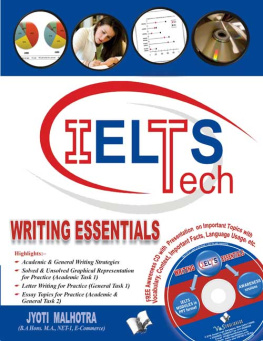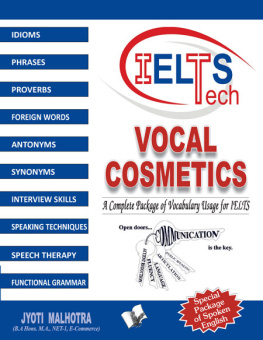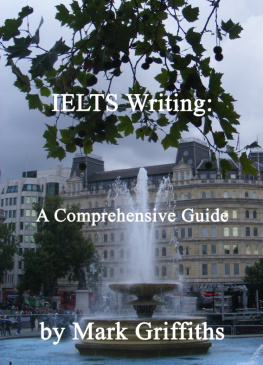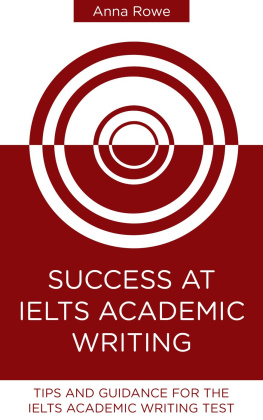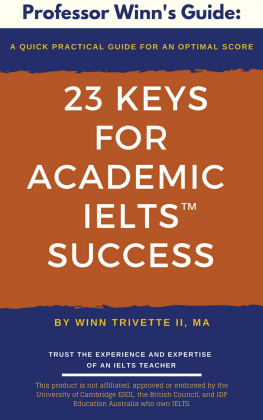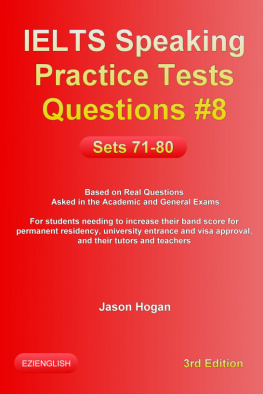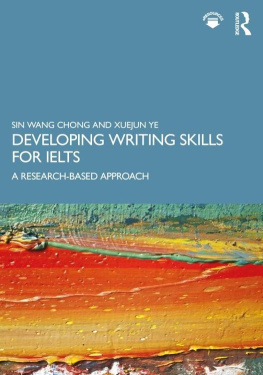Jyoti Malhotra - IELTS - Academic Module
Here you can read online Jyoti Malhotra - IELTS - Academic Module full text of the book (entire story) in english for free. Download pdf and epub, get meaning, cover and reviews about this ebook. year: 2015, publisher: V&S Publishers, genre: Children. Description of the work, (preface) as well as reviews are available. Best literature library LitArk.com created for fans of good reading and offers a wide selection of genres:
Romance novel
Science fiction
Adventure
Detective
Science
History
Home and family
Prose
Art
Politics
Computer
Non-fiction
Religion
Business
Children
Humor
Choose a favorite category and find really read worthwhile books. Enjoy immersion in the world of imagination, feel the emotions of the characters or learn something new for yourself, make an fascinating discovery.
- Book:IELTS - Academic Module
- Author:
- Publisher:V&S Publishers
- Genre:
- Year:2015
- Rating:5 / 5
- Favourites:Add to favourites
- Your mark:
- 100
- 1
- 2
- 3
- 4
- 5
IELTS - Academic Module: summary, description and annotation
We offer to read an annotation, description, summary or preface (depends on what the author of the book "IELTS - Academic Module" wrote himself). If you haven't found the necessary information about the book — write in the comments, we will try to find it.
IELTS - Academic Module — read online for free the complete book (whole text) full work
Below is the text of the book, divided by pages. System saving the place of the last page read, allows you to conveniently read the book "IELTS - Academic Module" online for free, without having to search again every time where you left off. Put a bookmark, and you can go to the page where you finished reading at any time.
Font size:
Interval:
Bookmark:
Preface
IELTS- TECH - A complete Toolkit for learning, practising and knowing about IELTS. As the world is growing smarter, the ways of its learning and getting education is also getting smarter day by day. IELTS-TECH (A TECHNICAL TOOLKIT OF LEARNING INTERNATIONAL LANGUAGE TESTING SYSTEM) acts as a smarter way to learn IELTS via Presentations on its Strategies. This Book is 4 in 1 which completes the wholesome package of READING, WRITING, LISTENING & SPEAKING skills, strategies (on SMART CD PRESENTATION) and its practice sessions. Undoubtedly, you get practice sessions and strategies online, or via some other books or media, but this book is unique because here you get everything in a single book, i.e., skills, strategies, practice sessions and smart tech CD presentation on IELTS.
This will really prove to be boon for the students.
The book is specially designed to investigate what skills and strategies are required in writing and speaking modules that distinguish the IELTS proficiency levels. There are a number of factors like Word Stress, Intonation, Rhythm, Cohesive Devices which are required on behalf of the IELTS candidates in order to determine their assessment s over four band scales: Fluency, grammatical range and accuracy, lexical resource and pronunciation. But how to attain all these skills is still a matter of discussion. Without understanding these technical aspects of English language, it is difficult for the IELTS candidates to score good grades in the IELTS Speaking Test as this is the criteria for their oral proficiency. In nonnative English country like India and China, no preference is given to learn all these skills. Only few study materials are provided to them to memorize the answers. No preference is to be laid in building of Rhetoric among the candidates. The major objective of the book is:
 Making the IELTS candidates proficient in the Speaking Test by teaching them all the Rhetorical devices like Word Stress, Intonation, Rhythm, Cohesive Devices, Fluency and Lexical Resource.
Making the IELTS candidates proficient in the Speaking Test by teaching them all the Rhetorical devices like Word Stress, Intonation, Rhythm, Cohesive Devices, Fluency and Lexical Resource.
 All these techniques should be properly designed and provided to the students in the form of study materials.
All these techniques should be properly designed and provided to the students in the form of study materials.
 Sound recorder (self-created by students in bobile phones) software should be used to maintain the Rate of Speech in the IELTS Speaking Task 2.
Sound recorder (self-created by students in bobile phones) software should be used to maintain the Rate of Speech in the IELTS Speaking Task 2.
 Speech Therapies should be given to the students to twist their tongues in L2. In 2001, the IELTS interview format and criteria were revised. A major change was the shift from a single global scale to a set of four analytic scales focussing on different aspects of oral proficiency. This study is concerned with the validity of the analytical rating scales. It aims to verify the descriptors used to define the score points on the scales by providing empirical evidence for the criteria in terms of their overall focus, and their ability to distinguish levels of performance.
Speech Therapies should be given to the students to twist their tongues in L2. In 2001, the IELTS interview format and criteria were revised. A major change was the shift from a single global scale to a set of four analytic scales focussing on different aspects of oral proficiency. This study is concerned with the validity of the analytical rating scales. It aims to verify the descriptors used to define the score points on the scales by providing empirical evidence for the criteria in terms of their overall focus, and their ability to distinguish levels of performance.
The Speaking Test band descriptors and criteria key indicators were analyzed in order to identify relevant analytical categories for each of the four band scales: fluency, grammatical range and accuracy, lexical resource and pronunciation.
The Speaking Skills Checklist is like this:
Production Skills, Pronunciation: Rhythm, Number and Length of Pauses, Stress, Intonation Contours.
Communication Skills:Fluency,Clarity,Coherence,ConfidenceCultural Appropriateness
Language Skills: Grammatical Accuracy, Grammatical Range, Vocabulary But how an IELTS student will build these skills is still the matter of discussion. The IELTS Books/Instructors or even the organization of IELTs are mum in this matter. No doubt, we can get this matter by netsurfing over different websites but what about the authenticity of the study material. The main problem in non -native English Country, how students twist their tongue in L2 (English Language) because while learning the language, they automatically get the influence of L1 (Mother Tongue) because it is their native language and this is natural. Nobody avoids it but learning global (English) Language with the help of Vocal Cosmetics/Rhetorical Devices will improve their tongue twisting into L2 (Second Language Acquisition) which automatically improve the proficiency of the candidate in the IELTS Speaking and Writing Test.
Keeping this viewpoint in mind, I have decided to put forth some technical aspects of learning, writing & speaking English through the medium of this book.This will truly help the students to speak good and perfect English.
Constructive suggestions are welcome. For any of your queries, please contact the author, Ms. Jyoti Malhotra.
Why IELTS-Tech is a Big Requirement:
 Candidates are not scoring more than 5.5 to 6.5 bands (A type of scoring system in which you are scored from 0-9 on a scale)
Candidates are not scoring more than 5.5 to 6.5 bands (A type of scoring system in which you are scored from 0-9 on a scale)
 Not able to speak English fluently
Not able to speak English fluently
 Institutions are providing only practice sessions and not techniques to appear in the IELTS
Institutions are providing only practice sessions and not techniques to appear in the IELTS
 Lack of knowledge of Grammatical rules
Lack of knowledge of Grammatical rules
 Speak more but score less
Speak more but score less
 Lack of standardised words, while speaking English
Lack of standardised words, while speaking English
 Lack of ideas for attempting TASK 2 in Writing as well as the Speaking Task 1, 2 and 3
Lack of ideas for attempting TASK 2 in Writing as well as the Speaking Task 1, 2 and 3
 Influence of Mother Tongue over the Second Language
Influence of Mother Tongue over the Second Language
IELTS-Tech Tool Kit

Meanings of Important Terms
VOCAL COSMETICS
A cosmetic for improving your voice. This product will fulfill the technical requirements of the candidates English which includes understanding of Words, Stress, Intonation and Syllable.
Speech Therapy
This product will enhance the tongue-twisting abilities of the candidate.
Awareness Sessions
This product will improve the exposure of the candidate to the current affairs. This also offers the candidate, complete choice of words, proverbs, etc. For this purpose, chapters are designed in the PowerPoint format to improve the writing and speaking skills of the candidate.
Lexical Resource
This product will help the candidate to improve the usage of words at different levels of speaking and writing.
Band Descriptors
| Listening | Description |
 40 Questions 40 Questions |  40 Questions 40 Questions |
 |
Font size:
Interval:
Bookmark:
Similar books «IELTS - Academic Module»
Look at similar books to IELTS - Academic Module. We have selected literature similar in name and meaning in the hope of providing readers with more options to find new, interesting, not yet read works.
Discussion, reviews of the book IELTS - Academic Module and just readers' own opinions. Leave your comments, write what you think about the work, its meaning or the main characters. Specify what exactly you liked and what you didn't like, and why you think so.

